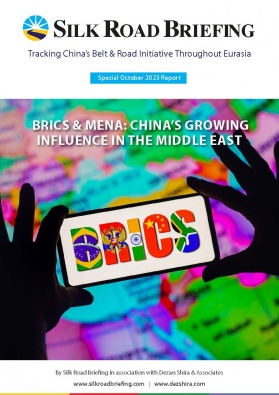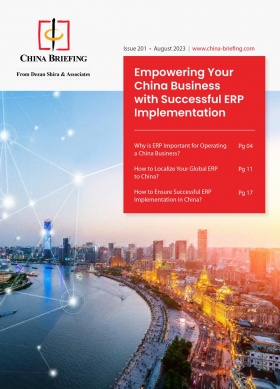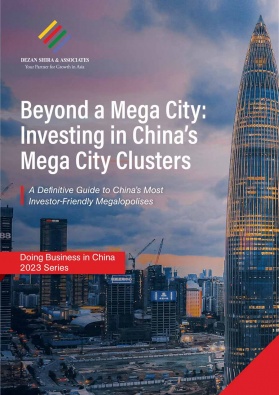China-Palestine Relations – Bilateral Trade, Investment and Diplomacy
China and Palestine established diplomatic relations in 1988. In recent years, China has sought to deepen bilateral trade and investment ties, pursuing a free trade agreement and integration with the Belt and Road Initiative. China’s growing influence in the Middle East positions it as a potential mediator in peace efforts, an ever more important role following the recent escalation of the conflict with Israel. We look at current China-Palestine relations, including the development of trade, investment, and diplomatic ties. See also our article on China-Israel relations.
China-Palestine diplomatic relations
China was one of the first countries in the world to recognize Palestine as a state in 1988, at which time the two parties officially established diplomatic relations. That same year, the office of the Palestinian Liberation Organization (PLO) that had previously been established in Beijing was converted to the Embassy of the State of Palestine. China established an Office of China to the Palestinian National Authority (PA) in Gaza in 1995, which was moved to Ramallah in 2004 and has remained there since. The two diplomatic missions remain active today, with China’s Ambassador to Palestine concurrently holding the position of Ambassador to Tunisia.
China has maintained friendly relations with Palestine in the decades since, engaging in regular official visits and dialogue. Over the past two decades, China has welcomed the Palestinian President and leader of the PA Mahmoud Abbas five times, most recently in June 2023. During this visit, Abbas’ and Chinese President Xi Jinping announced the establishment of a strategic partnership.
In December 2022, China and Palestine signed a Memorandum of Understanding (MoU) “on Matters of Common Interest under the Joint Construction of the ‘Belt and Road’ Initiative” (BRI), with the aim of improving “policy communication, facility connectivity, unimpeded trade, financial integration, and people-to-people connections”.
China has been viewed as a potential peacemaker in the region, with the ability to leverage its growing influence in the Middle East to push for negotiations. During the June meeting with Abbas, Xi Jinping stated that “China stands ready to play a positive role in helping Palestine achieve internal reconciliation and promoting peace talks.”
The country has continued to advocate for a two-state solution to the ongoing Israel-Palestine conflict, calling for the establishment of an independent state of Palestine based on the borders prior to 1967 as demarcated in the Armistice Agreements, with East Jerusalem as its capital.
Palestine’s statehood is the first principle in China’s three-point proposal to solve the conflict. The other two are increasing development assistance and international aid to Palestine and the convening of an authoritative and influential international peace conference to resume peace talks.
China has adopted a neutral position on the recent flare-up of the Israel-Hamas conflict in southern Israel and Gaza that began on October 7. On October 8, a Chinese Foreign Ministry Spokesperson in a statement called on “relevant parties to remain calm, exercise restraint and immediately end the hostilities to protect civilians and avoid further deterioration of the situation”, and reiterated China’s support for a two-state solution.
China has also held diplomatic relations with Israel since 1992, and in recent years has sought to develop bilateral trade and investment relations with the country.
China-Palestine bilateral trade
Bilateral trade between China and Palestine reached US$158 million in 2022, a year-on-year increase of 23.2 percent. The bilateral trade is overwhelmingly composed of Chinese exports to Palestine. In 2022, Palestinian exports to China reached just US$19,000, a year-on-year drop of 94.3 percent, while Chinese exports grew 23.5 percent year-on-year.
Chinese exports to Palestine accounted for around 4.4 percent of Palestine’s non-Israeli imports in 2022.
Among China’s main exports to Palestine were mechanical appliances and electrical machinery, as well as furniture.
|
Chinese Exports in Goods to Palestine, 2022 |
|
| Product | Value |
| Nuclear reactors, boilers, machinery, and mechanical appliances; parts thereof | US$37.16 million |
| Electrical machinery and equipment and parts thereof; sound recorders and reproducers, televisions, etc. | US$30.48 million
|
| Furniture; bedding, mattresses, mattress supports, cushions, and similar stuffed furnishings, etc. | US$8.49 million |
| Optical, photographic, cinematographic, measuring, checking, precision, medical or surgical, etc. | US$7.36 million
|
| Miscellaneous articles of base metal | US4$6.26 million |
| Source: ITC Trade Map | |
Palestine’s exports to China are negligible, in 2022 exporting around US$14,000 in machinery and mechanical appliances to China and an even smaller amount of apparel and clothing, according to ITC Trade Map.
| Palestinian Exports in Goods to China, 2022 | |
| Product | Value |
| Nuclear reactors, boilers, machinery, and mechanical appliances; parts thereof | US$14,000 |
| Articles of apparel and clothing accessories, knitted or crocheted | US$2,000 |
| Commodities not elsewhere specified | US$1,000 |
| Source: ITC Trade Map | |
China-Palestine Free Trade Agreement negotiations
Negotiations on a China-Palestine Free Trade Agreement (FTA) began in 2018 following the completion of a feasibility study. The first round of negotiations was completed in early 2019, and discussed “principles of negotiation, the treaty scope, the way to negotiate and key concerns”.
Negotiations appear to have been put on hold in the intervening years until the meeting between Xi and Abbas in June 2023, during which Xi called for “accelerating negotiations” on the China-Palestine FTA. At a regular press conference held the day after the meeting, a spokesperson for China’s Ministry of Commerce (MOFCOM) stated that “we are willing to expedite the negotiation process of the China-Palestine FTA and promote the upgrading of bilateral trade and investment cooperation.”
No further updates on the status of negotiations have been released since the meeting.
China has been actively deepening its trade and investment ties with countries in the Middle East in recent years. It is currently also seeking to advance negotiations on a possible FTA with the Gulf Cooperation Council (GCC), which comprises the countries of Bahrain, Kuwait, Oman, Qatar, Saudi Arabia, and the UAE.
China-Palestine bilateral investment
Investment
Of the most recent data available, as of the end of 2017, China’s accumulated direct investment in Palestine amounted to approximately US$490,000. In 2018, while there were no new direct investments from China in Palestine, the country signed new contract agreements worth US$8.87 million, marking a substantial increase of 194.7 percent compared to the previous year. These contracts resulted in a total revenue of US$4.89 million, showing a year-on-year growth of 65.8 percent.
Belt and Road Initiative
One of the cornerstones of the growing China-Palestine partnership is the implementation of investment projects under the BRI—the comprehensive infrastructure and economic development initiative launched by China, aimed at enhancing connectivity, trade, and economic cooperation with countries across Asia, Europe, Africa, and the Middle East. Palestine’s participation in this initiative holds significant promise for economic growth and development.
In December 2022, a milestone was reached when the Chinese government and the Palestinian government signed an MoU on Belt and Road Initiative Cooperation. This MoU marks a pivotal moment in their collaboration, signifying the alignment of their goals and interests within the framework of the BRI.
The Belt and Road Initiative offers opportunities for infrastructure development and investment. By leveraging the BRI, China and Palestine are poised to enhance their connectivity, trade, and economic integration. Key areas of cooperation and initiatives include:
- Transport infrastructure development: Within the BRI framework, China and Palestine are working on expanding and modernizing transportation networks. This may include the construction of the Gaza Seaport and its associated infrastructure, which will enhance connectivity not only within Palestine but also with neighboring countries like Jordan and Egypt.
- Renewable energy projects: China is actively collaborating with Palestine to develop renewable energy sources. For instance, they have jointly established a solar power plant in the West Bank, which not only promotes clean energy but also contributes to a stable power supply, supporting economic growth and reducing the region’s dependence on fossil fuels.
- Industrial zones and economic hubs: The BRI promotes the establishment of industrial zones and economic development areas in Palestine. A notable example is the Sino-Palestine Industrial Park near Bethlehem, which has attracted Chinese and international investments. This park serves as a manufacturing hub for various industries, creating job opportunities and promoting trade.
- Digital connectivity and e-commerce: Under the BRI MoU, Palestine has a big opportunity to upgrade its digital infrastructure. This includes the development of high-speed internet networks and e-commerce platforms and the overall facilitation of online trade for the growth of Palestine’s digital economy.
- Cultural and educational exchanges: The BRI fosters cultural and educational exchanges between China and Palestine. Through partnerships with Palestinian universities and cultural institutions, Chinese universities are offering scholarships to Palestinian students. Additionally, academic collaborations in fields like archaeology and history are strengthening cultural understanding and preserving historical heritage. In 2020, the An-Najah National University established the China – Palestine and Middle East Center for Industrial Parks Planning Technology, with the objectives of promoting sustainable planning of industrial parks in Palestine and the Middle East, facilitating expertise exchange and joint programs, and reinforcing cooperation in terms of joint research and visit exchanges between Palestine, the Middle East, and China in various fields.
For Palestine, participating in the BRI represents an opportunity to attract foreign direct investment, stimulate economic growth, and enhance regional integration. The BRI MoU lays the foundation for a collaborative approach to BRI projects, promising to bring substantial benefits to both countries.
Conclusion
China’s relations with Palestine can be understood within the broader context of China’s diplomatic engagements in the Middle East. China’s diplomatic ambitions in the region have become increasingly pronounced, as evidenced by its role in brokering diplomatic agreements and deepening its ties with various Middle Eastern countries.
In the wake of its successful mediation in restoring ties between Saudi Arabia and Iran, China has sought to establish itself as a diplomatic heavyweight in the Middle East. This approach aligns with the government’s vision of positioning China as a global leader that actively contributes to resolving international conflicts.
About Us
China Briefing is written and produced by Dezan Shira & Associates. The practice assists foreign investors into China and has done so since 1992 through offices in Beijing, Tianjin, Dalian, Qingdao, Shanghai, Hangzhou, Ningbo, Suzhou, Guangzhou, Dongguan, Zhongshan, Shenzhen, and Hong Kong. Please contact the firm for assistance in China at china@dezshira.com.
Dezan Shira & Associates has offices in Vietnam, Indonesia, Singapore, United States, Germany, Italy, India, Dubai (UAE), and Russia, in addition to our trade research facilities along the Belt & Road Initiative. We also have partner firms assisting foreign investors in The Philippines, Malaysia, Thailand, Bangladesh.
- Previous Article China Monthly Tax Brief: September 2023
- Next Article China-Israel Bilateral Trade and Investment Outlook








